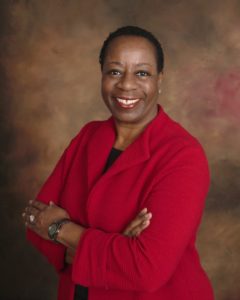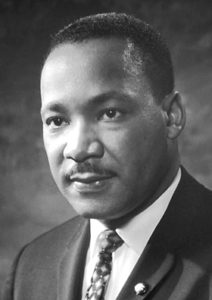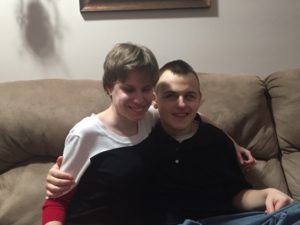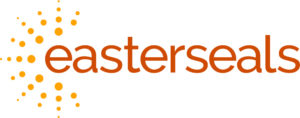Message From the New CEO: A Look Ahead
by Angela F. Williams

Angela F. Williams
Easterseals and its clients nationwide reached incredible milestones in 2017! Our entire network strengthened its resolve to protect services for people with disabilities while expanding programs that impacted the lives of nearly 1.5 million people with disabilities including veterans and seniors, as well as their families.
Seeing these successes reaffirms how vital it is that Easterseals continues to make a lasting difference in people’s lives. Because we were there for them, our clients were able to achieve their goals – and set new ones. As we begin 2018, we are inspired and committed to create even more opportunities to assure that people with disabilities, including veterans and seniors, can live, learn, work and play in their communities.
As I join Easterseals’ national office as its President and Chief Executive Officer, I am honored and privileged to lead this life-changing organization, especially as we prepare to celebrate our 100th Anniversary in 2019. The need for Easterseals has never been greater! More people today are living with disability. As the nation’s leading disabilities advocate and service provider, we are driven to achieve our vision of a world that embraces and values people with disabilities – and one that assures they have access to the services and supports they need in their communities to reach their full potential.
I look forward to sharing our plans, work and successes with you in this blog throughout the coming months. I also welcome hearing the ways in which Easterseals could help you and the ones you care for.
Until then, as one of my first official acts as President and CEO, I testified Thursday, January 18th to the House Subcommittee on Veterans Affairs. As a veteran, I am proud to share with Congress the impact that Easterseals is making in the lives of homeless veterans, delivering employment services for which we are distinguished, to help them find meaningful employment – often the first step in successful reintegration to their communities. In partnership with other community-based organizations, as well as the Departments of Veterans Affairs (VA), Housing and Urban Development (HUD) and Labor (DOL), Easterseals is a leader at the national and local levels in responding to the needs of veterans and their families – and the Homeless Veterans Reintegration Program about which I testified is just one example of the impact we’re honored to make in the lives of our nation’s heroes. I hope you watch my testimony here.
I look forward to getting to know you better. Together, I know we can make a difference!
Connect with Angela: LinkedIn | Twitter
- Request Angela Williams as a speaker for your event at angelawilliams@easterseals.com
- To set up an interview with Angela Williams, please email swatson@easterseals.com
- Read more about our new President and CEO, Angela F. Williams
- Learn more about Angela’s vision for Easterseals







 “Alexa, desk light on.”
“Alexa, desk light on.”

 From beginning to end, 2017 was a year packed with landmark moments, inspiring stories, impactful advocacy, and more! Throughout it all we’ve had thoughtful and insightful blog posts from a wide range of perspectives on topics relevant and important to all that happened this year. Check out the most read blog posts of 2017 and let us know in the comments what you’d like to see us writing about in 2018!
From beginning to end, 2017 was a year packed with landmark moments, inspiring stories, impactful advocacy, and more! Throughout it all we’ve had thoughtful and insightful blog posts from a wide range of perspectives on topics relevant and important to all that happened this year. Check out the most read blog posts of 2017 and let us know in the comments what you’d like to see us writing about in 2018!
 It’s that time of year once again when people make New Years resolutions.
It’s that time of year once again when people make New Years resolutions. Aaron Likens, author of Finding Kansas: Decoding the enigma of Asperger’s Syndrome, and the National Autism Ambassador for Easterseals, has spoken to over 80,000 people at over 900 presentations and has given to the world a revelation of how the Autism Spectrum Disorder mind works. His willingness to expose his inner most thoughts and feelings has unveiled the mystery the Asperger’s mind. Join him on his journey from hopelessness to hope.
Aaron Likens, author of Finding Kansas: Decoding the enigma of Asperger’s Syndrome, and the National Autism Ambassador for Easterseals, has spoken to over 80,000 people at over 900 presentations and has given to the world a revelation of how the Autism Spectrum Disorder mind works. His willingness to expose his inner most thoughts and feelings has unveiled the mystery the Asperger’s mind. Join him on his journey from hopelessness to hope. You know my story: the spots first showed up when I was 25. I began to notice dark patches in my vision and a lot of blurriness. “You have retinopathy,” the eye specialist told me. Laser treatments and eye surgeries didn’t help. A year later, I was blind.
You know my story: the spots first showed up when I was 25. I began to notice dark patches in my vision and a lot of blurriness. “You have retinopathy,” the eye specialist told me. Laser treatments and eye surgeries didn’t help. A year later, I was blind.
 Before I started giving speeches across the country about autism, I had no idea what “advocating” meant. The years went on but the idea never fully clicked. But that all changed with a single question.
Before I started giving speeches across the country about autism, I had no idea what “advocating” meant. The years went on but the idea never fully clicked. But that all changed with a single question.